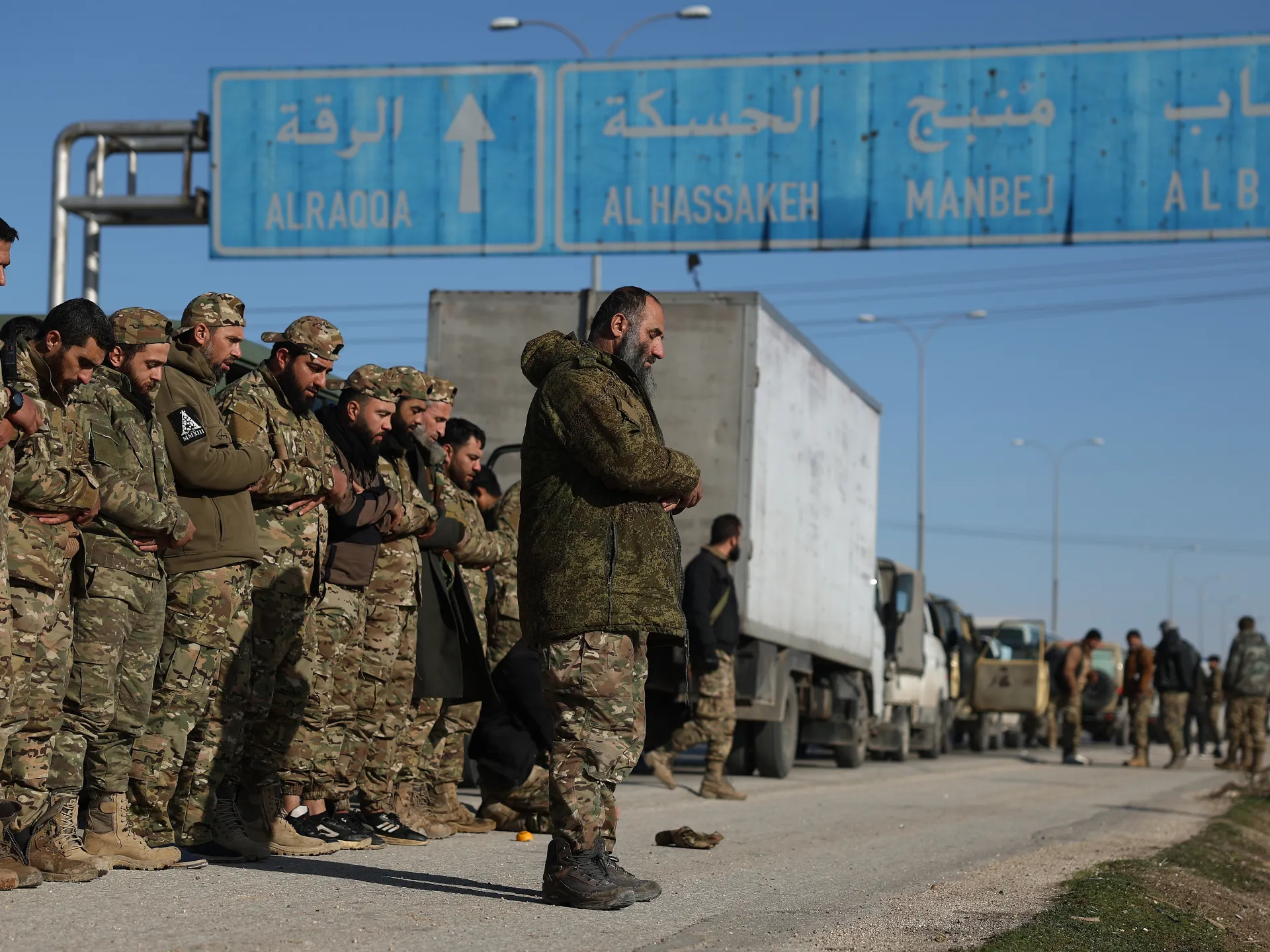Syrian army tells civilians to evacuate new front with SDF east of Aleppo | Syria’s War News
A ‘humanitarian zone’ is expected to remain open on Thursday, allowing residents to leave Deir Hafer and Maskana.
The Syrian army is telling civilians to evacuate parts of the rural Aleppo governorate after accusing the Syrian Democratic Forces (SDF) of building up troops in the area, following days of deadly fighting inside Aleppo city, as concerns rise over a new front in the simmering battle.
A “humanitarian zone” was expected to remain open on Thursday from 9am local time (6:00 GMT) to 5pm (14:00 GMT), allowing residents to leave Deir Hafer and Maskana in the eastern countryside. The army declared the areas closed military zones and sent in their own reinforcements earlier this week.
Recommended Stories
list of 4 itemsend of list
At least 23 people have been killed in clashes between the United States-backed, Kurdish-led SDF and the Syrian army that have gripped Aleppo for more than a week. Although a March deal promised to incorporate the SDF into Syrian state institutions, talks over incorporation have since stalled, leading to the renewed conflict.
A ceasefire announced on January 9 allowed SDF fighters to trickle out of Aleppo’s Ashrafieh and Sheikh Maqsoud Kurdish neighbourhoods to parts of northeastern Syria, where the SDF runs a semi-autonomous zone.
In Deir Hafer and Maskana, the military called on the SDF to withdraw to the other side of the Euphrates river, located east of the contested zone. The two sides have exchanged limited fire.
The government has also accused the SDF of carrying out drone strikes in Aleppo city, including one that hit the Aleppo governorate building on Saturday shortly after government officials hosted a news conference at the site.
The SDF, for its part, has accused the army of escalating attacks on infrastructure and facilities in Deir Hafer.
‘Eagerly awaiting’ incorporation deal
On Wednesday, Syria’s military closed off several roads in the al-Safira area of rural Aleppo province “for security reasons and to ensure the safety of citizens”, state news agency SANA reported.
The SDF troop buildup in the area included fighters from the Kurdistan Workers’ Party (PKK) and other “remnants of the former regime”, the agency added.
The PKK carried out a 40-year armed struggle in Turkiye, and Turkish officials said they were closely watching Syria’s latest round of fighting. Nuh Yilmaz, Turkiye’s ambassador to Damascus, travelled to Aleppo this week “to witness the restoration of peace and stability”.
“We are eagerly awaiting the implementation of the [March] agreement without the need for war,” Yilmaz told reporters. “This way, there will be no need for war, fighting or other methods, and we can all focus on a development agenda in peace.”
The Syrian Interior Ministry, meanwhile, released a group of SDF fighters in the Sheikh Maqsoud neighbourhood after securing the defection of an unknown number of SDF fighters.
Video footage broadcast by Al Jazeera Mubasher showed a group of several dozen men leaving a detention centre in Aleppo and boarding buses.
In a statement on Telegram, the ministry wrote those released were “found not to be involved in criminal acts or to have blood on their hands”.
“This step aligns with the state’s policy of opening the doors of return for all those who have gone astray and have not committed crimes against civilians,” it added.
Syrian President Ahmed al-Sharaa emphasised in an interview aired on state TV on Wednesday that he admired the “courage” of the Kurdish people, arguing that the December 2024 ousting of President Bashar al-Assad was the first “real response” to injustices against the community in decades.
But he also lashed out against the SDF, saying the group has refused to allow civilians to safely evacuate from the recent fighting and has pushed off efforts from the US and France to mediate a ceasefire.
The interview was intended to air on Shams TV in Erbil, the centre of Iraq’s semi-autonomous Kurdish region, but was spiked because of al-Sharaa’s hardline stance against the SDF, The Associated Press news agency reported.
Clips from the interview were instead publicised on state TV.
